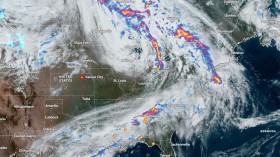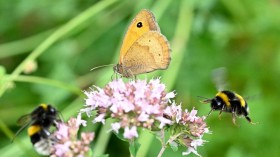Insect pollinators like bees love feasting on the sweet nectar and pollen of flowering plants, but while tasty, they also contain natural toxins that can negatively affect bee behavior, according to a new study.
Plants like lupin and rhododendron flowers, for example, produce these chemicals in their leaves and stems as a means of defense against herbivorous insects such as aphids. But they can also accumulate in pollen and nectar, affecting the memory, behavior and reproductive success of insect pollinators merely looking for a snack.
Bumble bees (Bombus terrestris) that visit lupin flowers will find that they produce fewer offspring, and smaller males especially, due to the chemical lupanine. Whereas rhododendron nectar was found to be toxic to honeybees - and a wild mining bee species (Andrena carantonica) - after ingesting chemicals called diterpenoids.
"Where rhododendron dominates landscapes we know that this may be to the detriment of other plant species but now it seems it could also impact invertebrates as well," lead study author Phillip Stevenson said in a statement.
But according to the study, not all plant chemicals are bad. For instance, researchers say that caffeine naturally found in nectar of Citrus and Coffea species can actually improve honeybee memory for the flower odors that they associate with their food reward.
"Plant chemicals in nectar and pollen can mediate specialization in pollinators, can drive plant pollinator interactions and can simply be toxic to pollinators where they have been selected for another purpose in the plant, such as defense against herbivores," Stevenson added.
While the study shows that plant chemicals can be beneficial, they also have the potential to impact ecosystems. The current global decline in bee populations, a phenomenon that's puzzling scientists, could possibly be due to plant toxins. Everything from pesticides, parasites, diet and climate change have also been suggested as possible culprits.
The new research will be presented at this week's joint BES/SFE conference in Lille.
For more great nature science stories and general news, please visit our sister site, Headlines and Global News (HNGN).
© 2024 NatureWorldNews.com All rights reserved. Do not reproduce without permission.


![Microplastics Escape Body's Gut to 'Infiltrate' the Brain, Kidneys and Liver [Study]](https://1471793142.rsc.cdn77.org/data/thumbs/full/70195/280/157/50/40/microplastics-escape-bodys-gut-to-infiltrate-the-brain-kidneys-and-liver-study.jpg)


